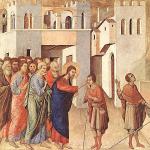 The Fourth Sunday of Lent remembers the work of St John Climacus and his book, The Ladder of Divine Ascent. Now this can be a difficult text for a non-monastic person to read and adapt for their own lives. It’s written for monks, telling them of the path which lies before them, with all kinds of advice as to how they can make sure they stay on it and don’t get diverted. And yet it is shown to have universal significance by being commemorated during Lent. What, exactly, can we get out of it?
The Fourth Sunday of Lent remembers the work of St John Climacus and his book, The Ladder of Divine Ascent. Now this can be a difficult text for a non-monastic person to read and adapt for their own lives. It’s written for monks, telling them of the path which lies before them, with all kinds of advice as to how they can make sure they stay on it and don’t get diverted. And yet it is shown to have universal significance by being commemorated during Lent. What, exactly, can we get out of it?
Obviously, one of the things we are to learn is the good which can be attained by asceticism. Those who have taken the religious path and have lived their lives as if in one continuous Lent show us the possibilities being presented to us as we imitate their example in part, even if for only forty days. Moreover, we are reminded that theology proper comes not from study but from those who have had direct experience of God, and experience which comes from a life of holiness (this is not to undermine the academic study of theology, but to remind us that academics typically discuss that which others have experienced, and so their writings must be understood as derivitive in nature, unless they are those who have also experienced that which they write). But there is more available to us here if we explore the depths of Climacus’ writings. The Ladder, while written for ascetics, can and does tell us much of the path to God, and has advice which is good not only for monks, but for laity as well, explaining the devotional appeal it has had for centuries.
Dweller of the desert and angel in the body, you were shown to be a wonder-worker, our God-bearing Father John. You received heavenly gifts through fasting, vigil, and prayer: Healing the sick and the souls of those drawn to you by faith. Glory to Him who gave you strength! Glory to Him who granted you a crown! Glory to Him who through you grants healing to all (Troparion of the Sunday of St John Climacus).
There is realitvely little we know for certain about St John Climacus beyond his writing of The Ladder of Divine Ascent, and a few, uncontroversial aspects of his life. It is clear that from a young age, around sixteen, he became a novice monk at Mt. Sinai (which, at this time, was thriving with various inter-related hermitages and monastic communities). Around nineteen he was tonsured by his spiritual director, Abba Martyrius. After forty or so years of being a monk (sometimes in a community, sometimes as a hermit, not always at Mt Sinai), he was made an abbott (at the central, and most important of the monastic communities at Sinai). It was at that point he wrote the Ladder. It seems that he appointed his brother, George, as abbot in his place soon before he died, giving him some time to prepare for his end without having to deal with tbe burdens being an abbot places upon one. Nonetheless, because of the scarcity of information we have on the saint, we are not even certain as to when he lived. From some of the theological concerns in his text, most scholars assume he flourished in the seventh century and dying around 680, although some suggest he might have lived in the sixth century, with the earliest date of his birth being around 525.[1] That we do not have more than a rough biography for him indicates that he lived as he proclaimed in his book; he was not concerned with his own glorification, but in leading his monks in the spiritual life, helping them attain (with himself) the salvation they all sought. His book records the lessons he learned, either through his own experience or through his direction of others, allowing him to give practical advice, written especially for monks but nonetheless with enough insight that even those of us who do not follow a life of strict asceticism can benefit from it (understanding, of course, the different expectations that one is to have in the secular world, and not all that is within it could be followed for us). The Ladder’s popularity led it to become the practice of Eastern monastic communities to read it aloud in its entirety during Lent.
O wise and blessed John, you gave us your teachings as fruits ever ripe to liven the hearts of those who hear them well. Your doctrine is like a ladder that leads to heavenly and everlasting glory the souls of those who honor you (Kontakion of the Sunday of St John Climacus).
What is it that we can learn from a study of the Ladder? St John Climacus saw our life as if we were placed upon a ladder leading to heaven, where we are expected to slowly climb up and make our way to God.[2] He encourages us not to despair when stumble through sin, but to get back up (through the help of grace) and to press on, until we attain our desire, God. But he is also realistic. He tells us that we should not push ourselves too much at one time, but rather, to deal with the issues we must address presently in our life, and fulfill them, before trying to climb up another rung on the ladder. We should not climb too quickly, because if we do, it is likely we will become careless and fall, either returning us to an earlier rung of the ladder, or entirely off it, and in hell.The best way to go up the ladder is in humility; we should have our eyes on our goal, salvation, not some earthly glory which can distract us and take us off our course. Indeed, he encourages us again and again to live in a spirit of repentence and humility, telling us these two attitudes are among the most important elements of a good spiritual life. He tell us that, when we die, God will look the kind of disposition we had in life. “When we die, we will not be criticized for having failed to work miracles. We will not be accused of having failed to be theologians or contemplatives. But we will certainly have some explanation to offer to God for not having mourned unceassingly.”[3] Mourning for our sins leads us away from them; as long as we look upon our own failings and feel sorrow for them, pride cannot take over and lead us assunder.
This does not mean we should not strive for perfection; instead, it is the end which we seek. But we must also be realistic and recognize our imperfection and leave room for grace. It is here that St John Climacus preserves the Eastern attitude towards salvation: we must work with God in faith. Our work must join in with his grace. Neither faith without works, nor works without faith, is good enough. “A man who asserts that he has the true faith and yet continues to sin is like a man without eyes. And the man who has no faith but who does good is like someone who draws water and then pours it into a barrel with holes.”[4] Moreover, we the help of others in our quest; those who have progressed further on their way to God can guide us and make sure we do not lose our way. “A soul with a good shepherd climbs easily heavenward, even if it has earlier done much wrong.”[5]
It is the pursuit of virtues which St John Climacus offers to us as the life of the Christian, wherever it is we are at. We must humbly do whatever we can, being content with the good we can do, and being ever mindful of those which we cannot. He understands that the practice of the virues will differ for those of us who live in the secular world, as can be seen in this passage, where he relates of a conversation he had with a group of married men:
“Do whatever good you may. Speak evil of no one. Rob no one. Tell no lie. Despise no one and carry no hate. Do not separate yourself from the church assemblies. Show compassion to the needy. Do not be a cause of scandal to anyone. Stay away from the bed of another, and be satisfied with what your own wives can provide you. If you do all this, you will not be far from the kingdom of heaven.”[6]
While he believes a monk is to make a more detailed study and practice of the virtues, and so his text goes into great lengths as to the kinds of virtues they will be able to attain, it is the spirit and not the letter of his book which can inspire the laity today. We are not to be solitary, but to rely upon others, upon the church if we want to attain perfection. Attaining some level of virtue will go a long way in overcoming its opposing vice. As we climb the ladder of perfection, we will begin low, but, for every vice we conquer, we will go up another rung, and for every virtue we put into practice, we go up two (one for the vice which has been overcome, one for the virtue itself). The path might be difficult, but, because of the grace of God, it is not impossible; when we stumble, we should not despair, but rather, push on, to humbly go forth in hope, because God desires our success and works for our salvation. “God is the life of all free beings. He is the salvation of all, of believers or unbelievers, of the just or the unjust, of the pious or the impious, of those freed from passions or caught up in them, of monks or those living in the world, of the educated or illiterate, of the healthy or the sick, of the young or the very old. He is like the outpouring of light, the glimpse of the sun, of the changes of the weather, which are the same for everyone without exception.”[7] God is the God of salvation, a just and merciful judge. We do not know who will or will not be saved; that determination is his alone to give. We are not to judge what will happen to others, because God alone has the right; if we take it upon ourselves, we will be the ones who are cut off. “To pass judgment on another is to usurp shamelessly a prerogative of God, and to condemn is to ruin one’s soul.”[8]
Humility is always needed, wherever we are, in the monastery, in the workforce, or at home with our family. We all need to know our weaknesses, and work to overcome them, but not out of turn. If we vainly seek glory, we shall take on too much, and we will fail. “The man who has come to know himself is never fooled into reaching for what is beyond him. He keeps his feet henceforth on the blessed path of humilty.”[9] We should never despair because we have not attained great heights of virtue, because, when we do, we show we are in the grips of pride. “If you wish to fight against some passion, take humility as your ally, for she will trad on the asp and the basilisk of sin and despair, and she will trample under foot the lion and the serpent of physical devilishness and cunning (cf. Ps. 90:13).[10] This humility, of course, will also prevent us from judging the sins of others too harshly, because we will know our own. “The zealous should be especially careful not to condemn the easygoing in case they draw down a worse sentence on themselves. That, I think, was why Lot was justified. Despite the sort of people he lived with, he never seems to have condemned them.”[11]
And yet, we should realize, the path does lead from our low estate to God, and the further we go on it, the closer we will be to God, and the more we shall be able to experience God in all his glory. While mastery of the virtues is a must, the path to God does not end with them. Rather, it ends in union with God through love. But to experience that love, we must make ourselves still and quiet, free from all distraction, and open ourselves up to God in pure prayer. When we enter into that silence, we can experience the glory of God. Through it, we develop an all-consuming love which unites us with him. But that love can only be had when we have had love for others, and without such love, there will be no love for God. “He who loved the Lord has first loved his brother, for the latter is proof of the former.”[12]
Jesus said, “All things are possible to him who believes” (Mk. 9:23). We are beckoned up the ladder of perfection, and we must believe with faith, in hope, that the ladder can be climbed. Faith and hope will overcome despair, and lead us on, until we reach the summit of the path, which is love. “Hope is the power behind love. Hope is what causes us to look forward to the reward of love. Hope is an abundance of hidden trearure. It is the abundant assurance of the riches in store for us.“[13] And that love, once attained, will make that which might seem impossible, becomes possible. “Love grants prophecy, miracles. It is an abyss of illumination, a fountain of fire, bubbling up to inflame the thirsty soul. It is the condition of angels, and the progress of eternity.”[14] Since love never ends, once we have found a pure love for God in our lives, while we will have climbed to the top of the ladder, the journey will have only just begun.
Footnotes
[1] See Kallistos Ware’s introduction to St John Climacus, The Ladder of Divine Ascent. Trans. Colm Luibheid and Normal Russell (New York: Paulist Press, 1982), 2-3.
[2] Since it is written for monks, and the kind of spiritual life they had before them, we will not address the rungs themselves here, but rather, look for some of the themes within the text and how they can apply to us who are not monks. But it is important to provide a list of the “rungs,” giving the reader their specific themes, and in the order St John Climacus puts them, so that the reader can have a greater grasp of the text itself. They are: Renunciation, Detachment, Exile, Obedience, Penitence, Remembrance of Death, Sorrow, Anger, Malice, Slander, Talkativeness, Falsehood, Despondency, Glutton, Lust, Avarice, Insensitivity, Fear, Vainglory, Pride, Simplicity, Humility, Discernment, Stillness, Prayer, Dispassion and Love. Kallistos Ware simplifies these into three specific categories: I. Break with the World, II, The Practices of the Virtues, and III Union with God. (cf. ibid., 12-13).
The ladder can be likened after Jacob’s ladder: “And he dreamed that there was a ladder set up on the earth, and the top of it reached to heaven; and behold, the angels of God were ascending and descending on it” (Gen. 28:12). While we might expect St John Climacus to make this connection early in his text, he waits until step 9 to do so, where he says, “The holy virtues are like the ladder of Jacob and the unholy vices are like the chains that fell off the chief apostle Peter. The virtues lead from one to another and carry heavenward the man who chooses them. Vices on the other hand beget and stifle one another.” St John Climacus, The Ladder of Divine Ascent, 152.
[3] Ibid., 145.
[4] Ibid., 259.
[5] Ibid., 259.
[6] Ibid., 78.
[7] Ibid., 74.
[8] Ibid., 157.
[9] Ibid., 226.
[10] Ibid., 228.
[11] Ibid., 113.
[12] Ibid., 288.
[13] Ibid., 289.
[14] Ibid., 289.












